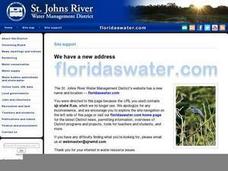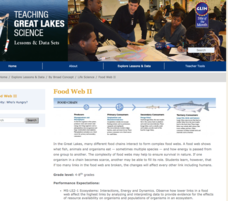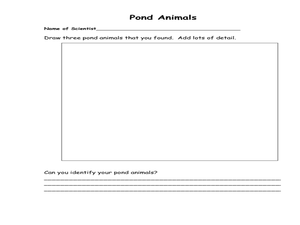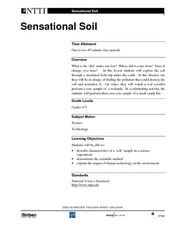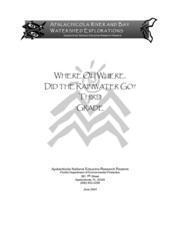Curated OER
Wetland vs. Stream Macroinvertebrates
A link to a comprehensive macroinvertebrate guide gives you the information needed to prepare for this field study activity. Sample macroinvertebrates are collected from areas representing different environmental conditions. Junior...
Curated OER
Marine & Aquatic Habitats Activities - Walk in the Wetlands
Students research various types of fresh water wetlands and identify the common animal and plant life in these different ecosystems. They further analyze the need to protect these wetlands and explore their varied uses.
Curated OER
Wetland in a Pan
Students examine wetlands and what the effects of destroying them will do. In this wetland lesson students relate the importance of wetland functions to their own needs.
Curated OER
Lesson 6 - Our Important Wetlands and Uplands
Students examine the benefits wetlands provide to man and nature. They compare types of wetlands in northeast or east-central Florida. They discover ways that uplands affect wetlands and water bodies.
Curated OER
Fieldwork: Horizons Under Ground: Digging Through Wetland Soil
Students study the different soil types and describe the different soils in various environments. In this soil lesson students walk to a reserve and discuss what they saw.
Curated OER
World of the Pond
Field trip! The class will review what they know about organisms that dwell in freshwater ponds, then trek down to the old water hole to collect specimens for examination. This includes several web links, useful tips, and an excellent...
Curated OER
Introduction to Restoration Lesson
Middle schoolers explore how pollution and invasive plants disrupt the ecosystem. In this restoration lesson students list materials that pollute wetlands, how people can keep them clean and ways in which invasive plants establish.
Curated OER
Eye On Conservation Drainage Basin
Students are able to describe the importance of wetland vegetation. They describe the impacts human activities have on water systems. Students compare and contrast the effect of different soil types on water filtration.
Curated OER
Water
Students learn about the history of Indiana's water and understand how easily pollution can contaminate the water supply. They also learn how little fresh water we have and how important it is to protect it.
Michigan Sea Grant
Food Web II
A food web consists of complex food chains and the more complex the web, the better likelihood of survival. Learners compare and contrast food webs and food chains and discuss concepts like the predator-prey and consumer-producer...
Curated OER
Aquatic Communities
Students watch a video about aquatic communities. They conduct an experiment that shows how movement of rivers change the landscape. They compare fresh and salt water communities and its wildlife.
Curated OER
Earth Water Distribution and Water Consumption
Young scholars explore the need for conserving fresh water and understand that it is a limited supply. In this water consumption lesson plan students participate in an activity and answer questions.
Curated OER
Pond and Pond Organisms
Students explore pond ecosystems. In this pond organism activity, students will use pond water and a plastic bad in order to locate and identify freshwater organisms. The activity is designed for younger grades, but includes an...
Curated OER
Wacky Water Critters
Young scholars visit a local creek or stream. They collect water samples from the creek and observe and sort the "water critters" they find in the sample, observing smaller organisms under a microscope if necessary. They identify each...
Curated OER
Relating Number of Insect Species to Water Quality
Students are asked to respond to questions such as:" Have there been surveys of the area to inventory the species?" (For example, for a wetland area, do they know what amphibians live there and how abundant they are?) Are there any...
Curated OER
Biological Sciences
Students examine biodiversity and interrelatedness concepts. In this ecology lesson students go on a field trip and fill out a data sheet.
Curated OER
Sensational Soil
Fourth and fifth graders explore soil by taking a simulated field trip under the earth. They go to an Internet site that runs a simulation which charges them with finding a source of pollution that could destroy all of Earth's soil, and...
Curated OER
Food Webs in a Pond
Students explore food chains and food webs in a pond and identify common creatures found in ponds. They look for tadpoles, fish, mites and other creatures in a pond during a field trip for first hand research.
Curated OER
Where Oh Where Did the Rainwater Go?
Third graders conduct an experiment to determine how water moves through different soils found in the Apalachicola River watershed. They read a scenario, conduct the experiment, answer follow-up questions, and draw the water movement...
Curated OER
Salty Solutions
Middle schoolers measure salt content in water. They determine salt content of four samples using a hydrometer.
Curated OER
Wanted: Water!
Students determine what percentage of the Earth is water and how much water is needed by humans.
Curated OER
Salt is Good On Sunflower Seeds, But What About Cypress?
Learners record their observations about growing a cypress plant and putting salt in the plant. In this cypress plant lesson plan, students observe and record what is happening as the cypress plant grows. This gives directions for...
Curated OER
A SALT WATER-Y WORLD
Students observe a model of the distribution of the earth's water and compare the relative volumes and percentages of types of water on earth.
Curated OER
Fertilized Death Water
Learners investigate the effect of chemicals on Platyhelminthes and planaria development. They observe the growth and development of planaria and investigate what fertilizer can do to living organisms when it is introduced into their...





